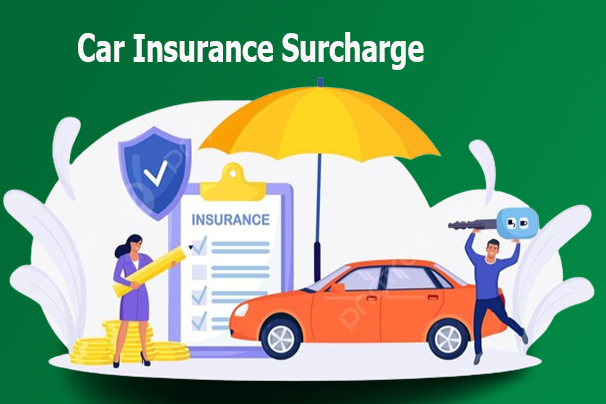A car insurance surcharge is an additional cost included in your insurance bill. It’s typically applied because of a traffic violation or if you’re found at fault in an accident. However, late payments, gaps in coverage, or adding another vehicle to your policy can also lead to a surcharge.

These extra charges might be temporary or lasting, depending on where you live, your insurance company, and the reason behind the surcharge. Furthermore, insurance providers view drivers who have committed moving violations and received tickets as having higher risks. These drivers are more prone to filing insurance claims, which increases the insurer’s risk exposure.
How Does It Work
Insurance surcharges serve as a method for insurance companies to recover the additional expenses they incur while processing your claim. These additional costs can result from various factors, such as claim payouts or administrative expenses. In addition, they may include:
- Lapses in coverage
- Late payments
- Traffic violations
- At-fault accidents
- State fees.
Various insurance providers typically assess your driving record both when you initially buy the policy and when you renew it. Moreover, behaviors that heighten the risk associated with insuring you are documented in your customer profile.
This includes speeding tickets, reckless driving, or driving under the influence. Additionally, the insurance company evaluates any filed claims to determine if a surcharge is justified.
Furthermore, whether the insurer utilizes an automated system or not, the surcharge may be applied automatically. However, the company may decide whether or not to impose a surcharge. The duration for which the surcharge remains in effect varies based on the type of violation committed.
What Causes a Car Insurance Surcharge?
Avoiding increases in your monthly insurance premiums due to surcharges is the first thing for most people. Meanwhile, some factors that can raise insurance rates are beyond your control, like your age, years of driving experience, and location.
Additionally, there are others that you can typically avoid by being a safe, responsible, and attentive driver. Safe driving isn’t just about preserving your life; it can also lead to large savings.
Collision with another driver
If you hit another driver and you are responsible, you might face an additional surcharge on your monthly insurance premium. Although your rates may not increase immediately during the current period, typically spanning six months, they could increase when it’s time to renew your policy.
However, certain insurance providers provide different forms of accident forgiveness, but the initial collisions won’t lead to an increase in rates. Additionally, some insurers consider customer loyalty when setting rates.
Bodily injury to someone
If you cause bodily harm to a third party requiring medical treatment, you may face a car insurance surcharge on your upcoming billing cycle. This is especially likely because medical payouts by insurance companies can be considerable, prompting your insurer to seek to mitigate some of those expenses.
Damage to Someone’s Property
If you damage someone else’s property while driving and file a claim through your insurance, you might encounter a car insurance surcharge. While this isn’t always guaranteed, causing property damage ranks among the most common reasons for surcharges to be applied.
How Much Will An Insurance Surcharge Affect My Premium?
The cost of the surcharge varies based on your insurance company and the specific event that caused it. For instance, being at fault in an accident where you total another person’s car could lead to a higher surcharge compared to a minor fender-bender.
How Long Will a Surcharge Last?
The duration of a surcharge is also based on the insurance provider, the state, and the reason for the surcharge. For instance, drivers in Massachusetts can anticipate surcharges lasting from three to six years before they are lifted, based on the particular incident.
However, drivers should be aware of getting many surcharges on their policy at the same time, especially if they are involved in another at-fault accident or a surchargeable offense. Moreover, this can lead to a more significant impact on their premium.
Why is Car Insurance added to Premiums?
Your insurance provider might get a driver surcharge on your car insurance premium because of a traffic violation or if you’re at fault in an accident. Moreover, missed payments and lapses in insurance coverage can also lead to surcharges.
These surcharges are mainly intended to offset the added expenses or risks associated with insuring a driver with a bad driving record.
How Can I Avoid Surcharges?
The most effective approach for drivers to avoid surcharges on their policy is by consistently practicing safe driving habits to the best of their ability. However, securing accident forgiveness coverage included in your policy can also assist in the event of an incident.
Despite this caution by drivers, accidents can still occur unexpectedly. Moreover, it’s crucial to have a clear understanding of what to anticipate when it comes to auto insurance claims.
Conclusion
A car insurance surcharge is any additional fee that your insurer includes in your monthly premium. Generally, these fees are temporary and apply after you have engaged in behavior that the insurance company deems to increase your risk as a driver.
